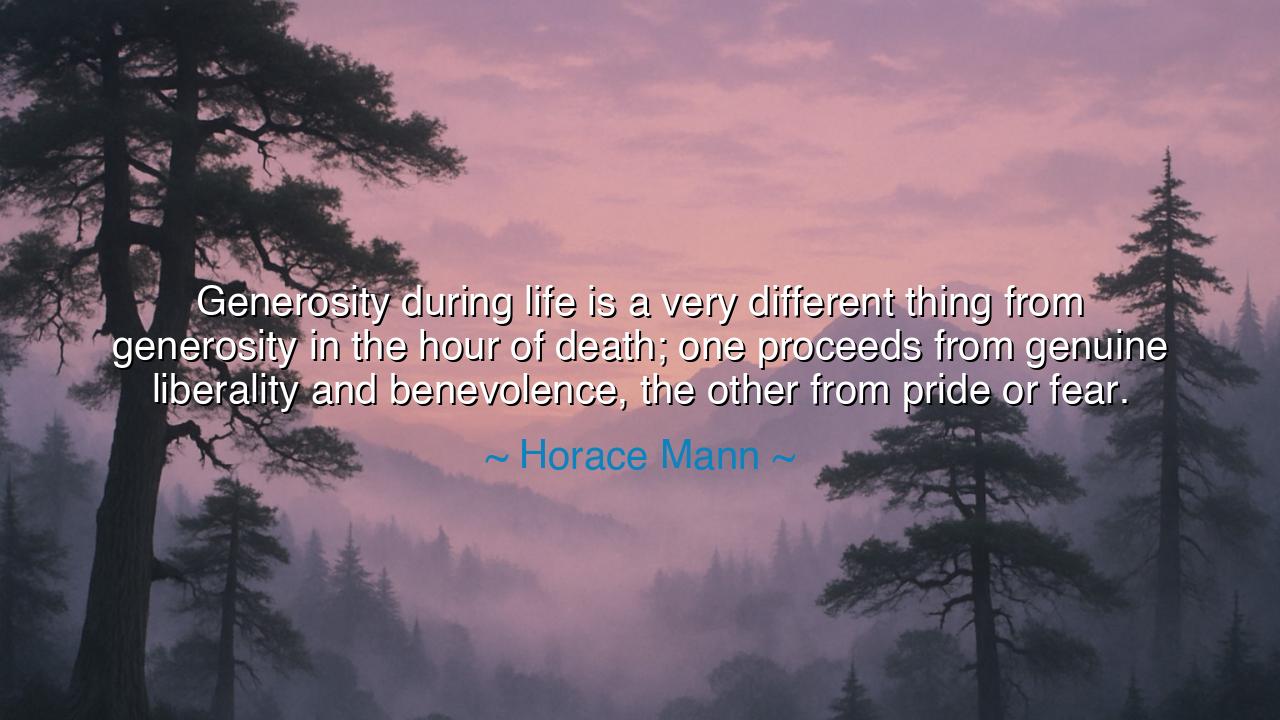
Generosity during life is a very different thing from generosity
Generosity during life is a very different thing from generosity in the hour of death; one proceeds from genuine liberality and benevolence, the other from pride or fear.






The words of Horace Mann — “Generosity during life is a very different thing from generosity in the hour of death; one proceeds from genuine liberality and benevolence, the other from pride or fear.” — shine like a mirror held to the human heart. They remind us that true virtue is tested not by what we give when our time is ending, but by what we give while we live — when our giving costs us something. Mann, the great American educator and reformer of the nineteenth century, knew that charity and generosity are among the highest virtues, yet he also understood how easily they can be corrupted by self-interest. His words pierce through the comfortable illusions of morality, showing that even good deeds can lose their purity when they are born from fear of judgment or pride in reputation rather than from sincere compassion.
When Mann speaks of “generosity during life,” he refers to the giving that springs from a living heart — one that beats with benevolence, empathy, and love for others. It is the act of one who sees need and responds without hesitation, who shares what he has not for glory, but because the suffering of others moves him. This is the generosity of the soul that delights in giving, that finds purpose not in possession, but in service. Such a man gives not because he must, but because he cannot help it — his heart, full of light, spills over. This is what Mann calls genuine liberality, the spontaneous and joyful giving that ennobles both the giver and the receiver.
But in contrast stands “generosity in the hour of death.” Mann warns that giving at the end of life, though often praised, can sometimes mask lesser motives. When death draws near, a man may part with his treasures not out of love, but out of fear — fear of divine judgment, or fear of how he will be remembered. Others may give from pride, seeking to engrave their names upon monuments, hospitals, or foundations, not out of concern for humanity, but to ensure that they will not be forgotten. Mann saw this clearly in his age, as wealthy men who had hoarded their fortunes during life suddenly turned charitable when death’s shadow fell upon them. Such charity may ease the conscience, but it cannot cleanse it. For true generosity, he reminds us, is not measured by what we leave behind, but by what we are willing to give away while we still hold it.
Consider the contrast between two men of history: Andrew Carnegie, the industrial titan who built libraries and schools across the world, and Ebenezer Scrooge, the fictional miser brought to life by Charles Dickens. Carnegie, though a man of great ambition, came to realize before his death that the purpose of wealth was to serve others. He gave away the majority of his fortune during his lifetime, saying, “The man who dies rich dies disgraced.” His philanthropy transformed communities and lives, and his name became associated not with greed, but with learning and opportunity. Scrooge, on the other hand, lived as a warning. Only at the approach of death, haunted by visions of his own loneliness and regret, did he open his heart. His repentance was genuine, yet late — a mercy, not a triumph. The difference between the two lies in the timing of their transformation: one gave from life’s fullness; the other from the brink of the grave.
Mann’s insight is thus both psychological and spiritual. He teaches that true generosity can only flourish when the heart is free — free from fear of loss, from the vanity of fame, from the bargaining with eternity that so often taints human goodness. Giving born of fear is transactional; giving born of love is redemptive. The former seeks reward or safety; the latter seeks only to bless. When we give from life, we give as creators; when we give only at death, we give as those undoing the damage of neglect. Therefore, the wise man does not wait until his final breath to discover compassion; he practices it daily, as naturally as breathing.
There is, too, a deeper spiritual truth in Mann’s words: that virtue must be lived, not merely professed. The man who keeps his wealth, his time, or his affection locked away until the end has not lived as a generous being; he has only postponed his awakening. Deathbed charity may bring relief to the conscience, but it cannot create the habit of goodness. Mann calls us, therefore, to a living generosity — a generosity of spirit that expresses itself not only in coin, but in kindness, patience, and presence. The greatest wealth we possess is the capacity to bring comfort and joy to others while we still walk among them.
So let this be your lesson, O seekers of wisdom: do not wait for the shadow of death to teach you what love demands. Give now, while your hands are strong and your heart is warm. Share your blessings before they become burdens. Visit the lonely, help the weary, uplift the broken — not because you fear the judgment of eternity, but because life itself is sacred, and every act of kindness is an offering to that sacredness. Let your generosity be a flame that burns brightly through the days of your living, not a flicker that ignites only when your strength is gone. For as Horace Mann teaches, the gift that is given from life endures beyond death — but the gift that is given from fear dies with the giver.






AAdministratorAdministrator
Welcome, honored guests. Please leave a comment, we will respond soon